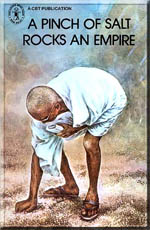
P.O. SEVAGRAM, DIST.WARDHA 442102, MS, INDIA. Phone: 91-7152-284753
FOUNDED BY MAHATMA GANDHI IN 1936
A Pinch of Salt Rocks An Empire
Children's Book : on Dandi March - Salt March

A PINCH OF SALT ROCKS AN EMPIRE
Compiled & Edited by : Sarojini Sinha
Table of Contents
- Map of March Route
- Chapter-1
- Chapter-2
- Chapter-3
- Chapter-4
- Chapter-5
- Chapter-6
- Chapter-7
- Chapter-8
- Chapter-9
- Chapter-10
- Chapter-11
- Chapter-12
- Chapter-13
About This Book
Compiled & Edited by : Sarojini Sinha
Illustration by : : Mrinal Mitra
First Published :1985
I.S.B.N :81-7011-291-5
Published by :Children's Book Trust
Printed at : Indraprastha Press
Nehru House,
4 Bahadur Shah Zafar Marg,
New Delhi,
India
Navajivan Mudranalaya,
Ahemadabad-380014
India.
© CBT, 1985
Download
Chapter - 11
The British Government was now inclined to negotiate. It called a Round Table Conference, which opened in London on November 12, 1930. But with neither Mahatma Gandhi nor any of the leaders of the Indian National Congress there, it was a meaningless exercise. The government realized this and the British Prime Minister, Ramsay MacDonald, expressed the hope that the Congress would send delegates to the Second Round Table Conference.
Gandhiji, Pandit Jawaharlal Nehru, Motilal Nehru, and more than twenty other Congress leaders were released from prison on January 26, 1931, the second Independence Day. Gandhiji immediately wrote a letter to the Viceroy asking for an interview.
Lord Irwin promptly agreed and the two met on February 17, 1931. And they met as equals, not as ruler and subject. It was the representative of one nation meeting the representative of another. It was a historic moment when Gandhiji climbed the steps of the Viceroy's House. The frail figure, clad in khadi, made a mockery of the imperial splendor around him. The Viceroy lived in such luxury that the Prince of Wales on a visit to India had remarked, "I never understood how a king should live until I saw the Viceroy of India."
The contrast between Gandhiji and Lord Irwin was marked, but the negotiations were held in an atmosphere of great cordiality and goodwill. This again showed how successful Gandhiji had been with the weapon of
satyagraha which does not hate or harm the opponent but tries to turn his heart with love and non-violence.
One night, Gandhiji insisted on walking from the Viceroy's palace to where he was staying. It was an eight-kilometer walk and the Viceroy said, "Good night, Mr. Gandhi, and my prayers go with you."
Once, when leaving, Gandhiji forgot his shawl. Lord Irwin gave it to him saying, "Gandhi, you haven't so much on that you can afford to leave this behind."
At one of the meetings, Lord Irwin asked Gandhiji if he would have tea. Gandhiji thanked the Viceroy, took a paper bag out of a fold in his shawl and said playfully, "I will put some of this salt into my tea to remind us of the famous Boston Tea Party." Both men laughed.
Under what came to be known as the Gandhi-Irwin Pact or the Delhi Pact, the civil disobedience movement was called off, prisoners were released and salt manufacture allowed on the coast. It was also agreed that the Indian National Congress would attend the Round Table Conference in London.
India is not a sickly child requiring nursing, outside help and other props.
In speeches and articles, Gandhiji urged unity between Hindus and Muslims, strict observance of the conditions of the pact, energetic work on the constructive programmes, including boycott of foreign cloth and non-violent picketing of liquor shop.
He explained the reasons for accepting the terms of the agreement: "Whilst a
satyagrahi never yields to panic...neither does he think of humiliating the other party.... He may not swerve from the path of justice and may not dictate impossible terms. He may not pitch his demands too high, neither may be pitch them too low. The present settlement, I submit, satisfied all these conditions.
"We are going to ask for nothing less than independence. Whether we will get it is another matter."
The Indian National Congress elected Gandhiji to be its representative at the Second Round Table Conference in London.
He sailed for London on August 29, 1931, by the S.S. Rajputana. Before leaving, he warned that there was every chance of his returning empty-handed. He said, "As the elephant is powerless to think in terms of the ant, in spite of the best intentions in the world, even so is the Englishman powerless to think in terms of the Indian."